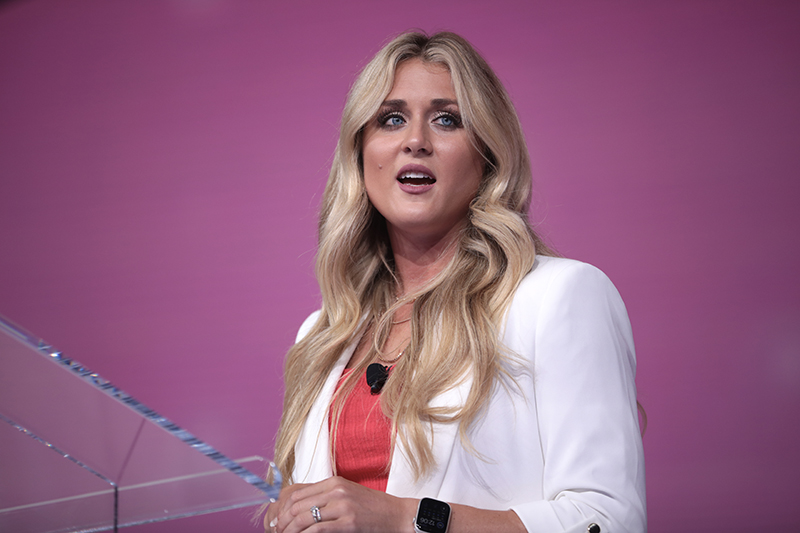South Dakota Republicans consider restricting treatments that help trans youth transition
Bill would threaten doctors who prescribe hormones or surgery to trans youth with jail time and a possible fine
By John Riley on January 24, 2020 @JRileyMW

On Wednesday, a South Dakota House committee approved a bill that would ban medical providers from prescribing hormones or gender confirmation surgery for transgender youth.
The bill, sponsored by State Rep. Fred Deutsch (R-Florence), originally made it a felony for any medical professional to provide treatments, including hormones or puberty blockers, to anyone under the age of 18.
The bill was subsequently amended to make the act of prescribing such treatments a Class 1 misdemeanor, lower the age at which a person can begin receiving the treatments from 18 to 16, and exempt medical support staff like nurses or medical assistants.
Under the revised bill, any doctor who provides transition-related treatments to a minor under the age of 16 could face up to a year in prison and a fine of up to $2,000.
The measure was approved by the House State Affairs Committee by an 8-5 vote, with three Republicans voting against it, reports The Washington Post.
Critics of the bill say this will effectively discourage doctors not to provide any form of gender-affirming health care for transgender people, lest they face criminal charges.
They also noted during the hearing that fewer than four physicians in South Dakota offer puberty blockers and hormone therapies, and it is unclear if any perform gender confirmation surgeries — thus making the bill an exercise in political posturing, rather than addressing a specific problem or need.
Proponents of the bill take umbrage — as voiced in a National Review article by Madeleine Kearns — at the suggestion that the bill is anti-LGBTQ, saying that they are concerned that transgender teenagers are too young to make permanent decisions about their health and may live to regret those decisions.
Some members of the coalition pushing for the bill are so-called “ex-transgender” people or rely on claims from people within the “de-transition” movement who say that their transition did not help them with their underlying mental health issues or depression.
Indeed, Deutsch said the impetus for the bill was meeting people who formerly identified as transgender and claimed they were “hurting and suffering” as a result of undergoing surgical or hormonal treatments.
He admitted he consulted with the anti-LGBTQ Liberty Counsel and the Kelsey Coalition, a “nonpartisan,” volunteer-run organization that claims to be interested in protecting youth who identify as transgender.
Deutsch also attended a conference, hosted by the conservative Heritage Foundation, which addressed proposals to ban transition-related treatments for youth in various states, the Post reports.
The Republicans who voted against the bill expressed reservations on how it would be enforced. Rep. Kent Peterson (R-Salem) questioned how the state would access confidential medical information and track prescriptions to ensure that they’re not being given to minors.
Majority Whip Michael Diedrich (R-Rapid City) said he was convinced by testimony from parents, transgender youth, and medical experts that puberty blockers have been helpful to people suffering from gender dysphoria, and that their effects aren’t permanent.
In fact, a recent paper published in the journal Pediatrics found that transgender youth who have access to puberty blockers are less likely to have suicidal thoughts.
Diedrich attempted to remove puberty blockers from the list of treatments banned by the bill, but his amendment was defeated.
Dr. Alexis Chavez, the medical director for The Trevor Project, a trans psychiatrist who specializes in LGBTQ youth health and has founded several trans health care clinics, criticized the bill as harmful to trans youth.
“This dangerous bill threatens responsible medical professionals with imprisonment for providing best-practice medical care to transgender youth. It cannot be allowed to become law,” Chavez said in a statement.
“The research is clear: supporting transgender and non-binary youth in their identities has positive mental health outcomes and decreases suicide risk. Cutting off access to medically necessary care will cost lives,” Chavez added. “We call on South Dakota’s lawmakers to stop using trans young people as political pawns and to instead work to create safe and affirming environments for all youth to thrive.”
Read more:
HRC to honor CNN’s Don Lemon for LGBTQ visibility and advocacy at Time to THRIVE Conference
Human Rights Campaign’s PAC issues endorsements in five 2020 U.S. Senate races
Janelle Monáe to receive Equality Award at HRC’s 2020 Los Angeles Dinner
Caitlyn Jenner Backs New York County’s Transgender Sports Ban
The transgender reality TV star defended an order banning sports teams with trans players from using a New York county's sports facilities.
By John Riley on March 19, 2024 @JRileyMW
Former Olympic gold medalist and reality TV star Caitlyn Jenner expressed support for a conservative New York County's policy banning transgender female athletes from using county-owned facilities.
Nassau County Executive Bruce Blakeman instituted the ban via executive order last month.
Under it, any sports teams designated specifically for female athletes with transgender team members are prevented from competing or practicing at Nassau's 100-plus county facilities. This includes all ballfields, basketball and tennis courts, swimming pools, and ice rinks.
Blakeman argued that allowing trans females to compete against cisgender female athletes is unfair and potentially dangerous, due to the biological and physiological differences that favor transgender athletes in any match-up.
Hunter Schafer No Longer Wants to Play Trans Roles
Actress Hunter Schafer, who plays a trans teen in "Euphoria," plans not to take on any more trans roles to avoid being typecast.
By John Riley on April 4, 2024 @JRileyMW
Following her critically acclaimed performance as trans teen Jules Vaughn in Euphoria, Hunter Schafer says she no longer wants to play transgender roles.
Speaking with GQ magazine, the 25-year-old actress, who is herself transgender, noted that she has turned down "tons of trans roles" because she doesn't want to be typecast and prefers her gender identity not define the rest of her career.
"I don’t want to be that, and I find it ultimately demeaning to me and what I want to do," Schafer said. "I worked so hard to get to where I am, past these really hard points in my transition, and now I just want to be a girl and finally move on."
NCAA Sued for Allowing Trans Participation in College Sports
More than a dozen female athletes are suing the NCAA, alleging that transgender competitors in female sports violates Title IX.
By John Riley on March 20, 2024 @JRileyMW
More than a dozen female athletes have sued the National Collegiate Athletic Association over its transgender athlete participation policy.
The 16 female athletes bringing the lawsuit allege that the NCAA’s policy violates their civil rights under Title IX, a federal law that prohibits sex-based discrimination at any educational institution receiving federal funds.
Title IX has ensures that more schools provide athletic teams to women, thereby creating more opportunities to compete.
The athletes at the center of the lawsuit claim that transgender women who have undergone male puberty have a natural physiological advantage over cisgender women.
Support Metro Weekly’s Journalism
These are challenging times for news organizations. And yet it’s crucial we stay active and provide vital resources and information to both our local readers and the world. So won’t you please take a moment and consider supporting Metro Weekly with a membership? For as little as $5 a month, you can help ensure Metro Weekly magazine and MetroWeekly.com remain free, viable resources as we provide the best, most diverse, culturally-resonant LGBTQ coverage in both the D.C. region and around the world. Memberships come with exclusive perks and discounts, your own personal digital delivery of each week’s magazine (and an archive), access to our Member's Lounge when it launches this fall, and exclusive members-only items like Metro Weekly Membership Mugs and Tote Bags! Check out all our membership levels here and please join us today!
The Magazine
-
Most Popular
 School Board Cancels '30 Rock' Star's Anti-Bullying Talk
School Board Cancels '30 Rock' Star's Anti-Bullying Talk  Aaron Rodgers Suggests AIDS Was Created by U.S. Government
Aaron Rodgers Suggests AIDS Was Created by U.S. Government  Biden's New School Rules Protect LGBTQ Students
Biden's New School Rules Protect LGBTQ Students  LGBTQ Websites Could Be Sued Under Kansas Anti-Porn Law
LGBTQ Websites Could Be Sued Under Kansas Anti-Porn Law  How Vending Machines Can Save Lives in Substance Abuse Crisis
How Vending Machines Can Save Lives in Substance Abuse Crisis  Cherry Returns With An Intimate Affair
Cherry Returns With An Intimate Affair  'The Nance' at 1st Stage: Pansy Division (Review)
'The Nance' at 1st Stage: Pansy Division (Review)  Star Trek Discovery's Wilson Cruz Keeps Making Television History
Star Trek Discovery's Wilson Cruz Keeps Making Television History  Conservative Ad Makes Case for Transgender Rights
Conservative Ad Makes Case for Transgender Rights  Grindr's New Feature "Roam" Connects Users Around the Globe
Grindr's New Feature "Roam" Connects Users Around the Globe
 Biden's New School Rules Protect LGBTQ Students
Biden's New School Rules Protect LGBTQ Students  School Board Cancels '30 Rock' Star's Anti-Bullying Talk
School Board Cancels '30 Rock' Star's Anti-Bullying Talk  Aaron Rodgers Suggests AIDS Was Created by U.S. Government
Aaron Rodgers Suggests AIDS Was Created by U.S. Government  LGBTQ Websites Could Be Sued Under Kansas Anti-Porn Law
LGBTQ Websites Could Be Sued Under Kansas Anti-Porn Law  HRC's Kelley Robinson Makes the Time 100 List
HRC's Kelley Robinson Makes the Time 100 List  Grindr's New Feature "Roam" Connects Users Around the Globe
Grindr's New Feature "Roam" Connects Users Around the Globe  Kansas Governor Vetoes Trans Health Care Ban
Kansas Governor Vetoes Trans Health Care Ban  Court Blocks West Virginia Trans Athlete Ban
Court Blocks West Virginia Trans Athlete Ban  DC Black Pride 2024: Everything You Need to Know
DC Black Pride 2024: Everything You Need to Know  Conservative Ad Makes Case for Transgender Rights
Conservative Ad Makes Case for Transgender Rights
Scene
Metro Weekly
Washington's LGBTQ Magazine
P.O. Box 11559
Washington, DC 20008 (202) 638-6830
About Us pageFollow Us:
· Facebook
· Twitter
· Flipboard
· YouTube
· Instagram
· RSS News | RSS SceneArchives
- "We use cookies and other data collection technologies to provide the best experience for our customers. You may request that your data not be shared with third parties here: "Do Not Sell My Data
Copyright ©2024 Jansi LLC.









